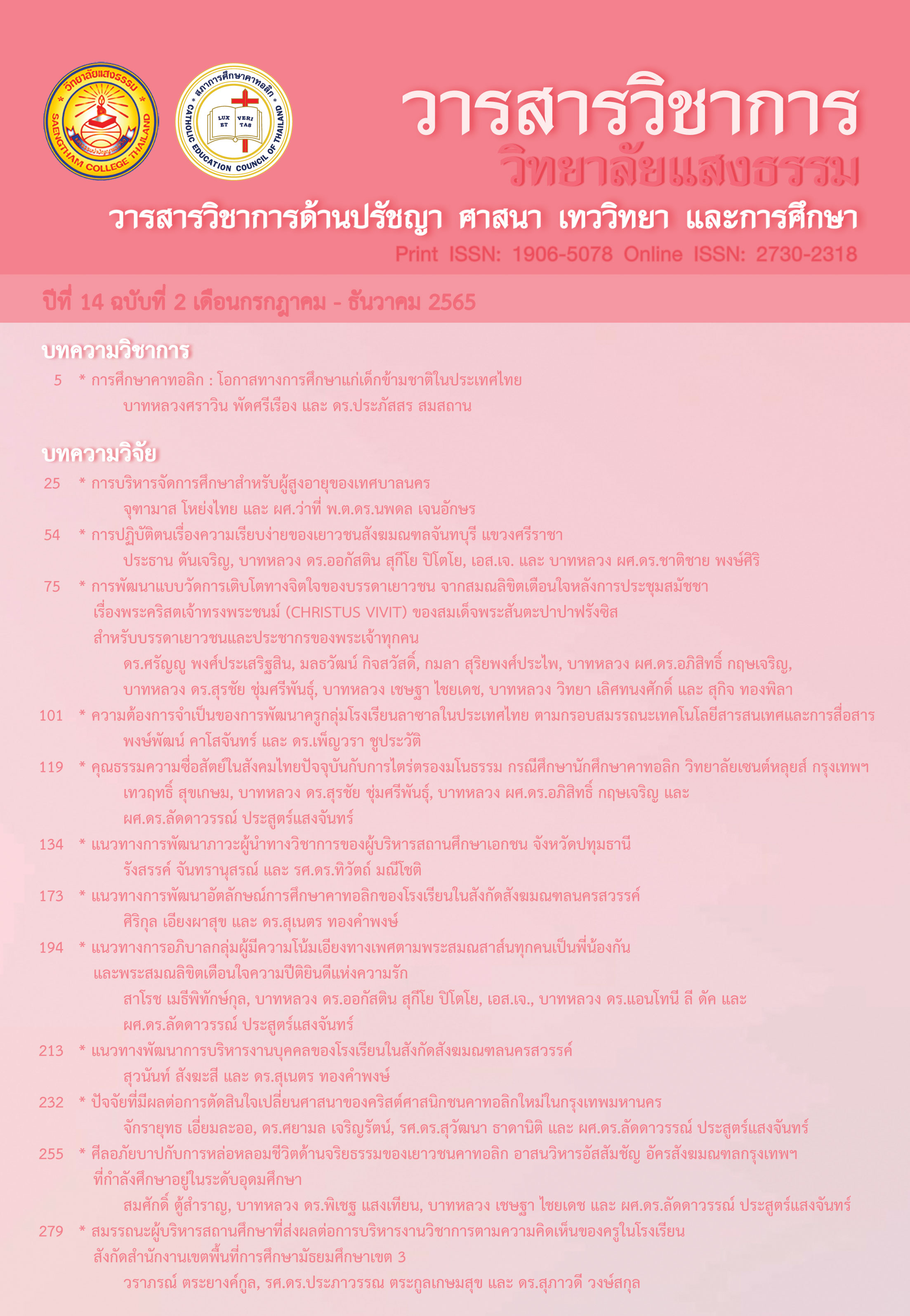The Pastoral Guidelines For Alternative Sexual Orientations Following the Encyclical Letter “Fratelli Tutti” and the Apostolic Exhortation “Amoris Laetitia”
Main Article Content
Abstract
The purpose of this qualitative research is to find pastoral guidelines for alternative sexual orientations following the encyclical letter Fratelli Tutti and the apostolic exhortation Amoris Laetitia by analyzing the encyclical letter, the apostolic exhortation, the Scripture and relevant documents, as well as qualitative data by focused - group interviews of five experts selected specifically, followed by analyzing the data for subject matters.
The results of this research reveal:
The research found that the encyclical letter Fratelli Tutti and apostolic exhortation Amoris Laetitia did not directly suggest pastoral guidelines for the alternative sexual orientations but the documents promoted care for people at the margins of society, who had not received the equality, including those of the alternative sexual orientations who had been affected by the misunderstanding of their identity and individuality in society. In addition, brotherhood and friendship in the Catholic Church suggest in the documents would lead the way to fraternally journey with them by 1) Seeing everyone inclusively as our brothers and sisters 2) Counting no strangers in the Kingdom of God 3) Stepping out of oneself to accompany the abandoned 4) Opening one’s heart to dialogue as the essence to understand one another 5) Relying on faith as the servant of Fraternity and 6) Promoting family as the institution of love, rest and warmth. As the Catholic Church has teachings by saying that as persons with alternative sexual orientation is not a sin differently from homosexual activity. They should be chastity and live as good Christian life following on doctrine and teaching of the Catholic Church correctly.
As the pastoral guideline for the alternative sexual orientation according to the interviewed group comments of the senior experts as follow 1) Families and people who are around alternative sexual orientation should accept and understand what they are. So, they would be encouraged to accept and valuable on themselves. 2) The involving institution or the relevant authorities on the catholic catechism formation at the point of sexuality following the plan of God should be continued and propagated to people with alternative sexual orientation for understanding the Catholic Church teaching and Her stance on sexuality better. 3) Families and relevant authority should instruct and advice the appropriate guideline for people with alternative sexual orientation’s life following the Catholic Church teaching. Especially, the young or the youth those who have a self-knowledge as same – sex attraction. 4) At the point of virtual formation, the family should be mainstream forming their children following the teaching of the Church together with moral promotion of the Church. 5) The Catholic Church or relevant authorities should give spaces or chances for people with alternative sexual orientation to participate with the Church activities by spirituality as love and service fully and commonly. 6) The Catholic Church should promote the teaching on sexual orientation to family and society for accepting, respecting and living together with them brotherly. Especially for the children who have a self-knowledge as homosexual orientation in Christian family can live and grow in faith, love and hope having a better life in the future. and 7) The Catholic Church should have a manual book particularly for the people with alternative sexual orientation.
Article Details

This work is licensed under a Creative Commons Attribution-NonCommercial-NoDerivatives 4.0 International License.
- The academic and research articles, as well as the content and opinions expressed therein, published in Saengtham College Journal are solely the responsibility of the respective author(s).
- Articles published in Saengtham College Journal are the property of Saengtham College. Reproduction, modification, or dissemination of all or part of the content in any form without written permission from Saengtham College is prohibited.
- Articles published in Saengtham College Journal are protected under the Copyright Act.
References
คณะกรรมการคาทอลิกเพื่อคริสตศาสนธรรม แผนกคริสตศาสนธรรม. (2562). หนังสือคำสอนพระศาสนจักรคาทอลิก. โรงพิมพ์อัสสัมชัญ.
คณะกรรมการคาทอลิกเพื่อคริสตศาสนธรรม แผนกพระคัมภีร์. (2557). พระคัมภีร์คาทอลิก ฉบับสมบูรณ์. คณะกรรมการคาทอลิกเพื่อคริสตศาสนธรรม แผนกพระคัมภีร์.
เทิดเกียรติภณช์ แสงมณีจีรนันเดชา และ รัตพงษ์ สอนสุภาพ. (2562). ความเสมอภาคของกลุ่มผู้มีความหลากหลายทางเพศต่อการสมรสและรับรองบุตรในประเทศไทย: ในมุมมองของนักวิชาการและนักเคลื่อนไหวทางสังคม. วารสารมนุษยศาสตร์และสังคมศาสตร์ มหาวิทยาลัย ราชพฤกษ์. 5(2).
ไทยพีบีเอส. (2562, 16 ธันวาคม). จี้รัฐ แก้ปัญหาความรุนแรงใน LGBTQ. https://news.thaipbs.or.th/content/287104.
ไทยรัฐ. (2560, 18 พฤศจิกายน). เพศที่สามกับสังคมไทย สื่อสร้างสรรค์หรือทำลายภาพลักษณ์. https://www.thairath.co.th/news/local/953020.
แผนกคริสตศาสนธรรม อัครสังฆมณฑลกรุงเทพฯ. (2559, 10 มีนาคม). ทำไมพระเจ้าทรงสร้างมนุษย์เป็นชายและหญิง. http://www.kamsonbkk.com/catholiccatechism/youcat/6662%E0%B8%97%E0%B8%B3%E0%B9%84%E0%B8%A1%E0%B8.
ฟรังซิส, พระสันตะปาปา. (2560). พระสมณลิขิตเตือนใจความปีติยินดีแห่งความรัก (AMORIS LAETITIA). (สื่อมวลชนคาทอลิกแห่งประเทศไทย, ผู้แปล). สภาประมุขบาทหลวงโรมันคาทอลิกแห่งประเทศไทย.
ฟรังซิส, พระสันตะปาปา. (2563). พระสมณสาส์นทุกคนเป็นพี่น้องกัน (FRATELLI TUTTI). (เซอร์มารี หลุยส์ พรฤกษ์งาม, ผู้แปล). สหมิตรพัฒนาการพิมพ์.
วิศรุต สินพงศพร. (2563, 10 กรกฎาคม). อธิบาย พ.ร.บ.คู่ชีวิต vs สมรสเท่าเทียม ดราม่า สำคัญที่จะมีผลต่อชีวิตของกลุ่ม LGBT. https://workpointtoday.com/15explainer-lgbt/
Francis, Pope. (2019). CHRISTUS VIVIT, APOSTOLIC EXHORTATION. OUR SUNDAY VISITER PUBLISHING.


